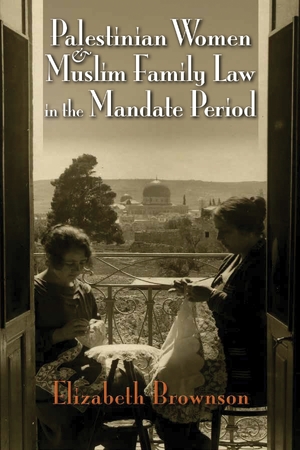"I highly recommend Palestinian Women and Muslim Family Law in the Mandate Period, both for its important contribution to the history of Palestinian women’s lives during the Mandate, as well as to those looking for a coherent model of a clearly articulated analysis of shari'a and its applications in family law."—International Journal of Middle East Studies
"This book will fascinate scholars and students in the field of Israeli-Palestinian history, gender, and empire."—Nancy Gallagher, professor emerita, University of California, Santa Barbara
"Brownson weaves together a nuanced presentation of the complex formal structures of Muslim family law in Mandate (and post-Mandate) Palestine with the actual experience of the women involved in it. Particularly striking is the degree to which women could bend a strongly patriarchal system to achieve their own needs."—Stephen Humphreys, professor emeritus, University of California at Santa Barbara
Description
In this volume, Brownson sheds new light on Palestinian Muslim women’s agency in shari‘a courts from the British Mandate period to the present. Her extensive archival research on wife-initiated maintenance claims, divorce, and child custody cases deepens our understanding of women’s position in the courts, demonstrating that Muslim women were and are active participants in their legal affairs. Using court registers and interviews, Brownson uncovers a variety of ways women have manipulated the system to their benefit despite its patriarchal bias. She also finds that few reforms were implemented during the Mandate period. The British were uninterested in improving colonized women’s legal status and sought to avoid further antagonizing Palestinians. At the same time, Palestinians wished to uphold the one indigenous institution they still controlled while both British rule and Zionism threatened their nationalist aspirations.
Although Palestinian women have had few alternatives to using this male privileged system to redress grievances with their husbands and in-laws, they continue to resist its injustices every day. Brownson finds that women’s understanding of family law fundamentals has enabled some to deftly navigate the system; however, a unified, reformed law reflecting society’s current needs is required so women can have full access to their rights.
About the Author
Elizabeth Brownson is associate professor of history at the University of Wisconsin–Parkside.
July 2019

